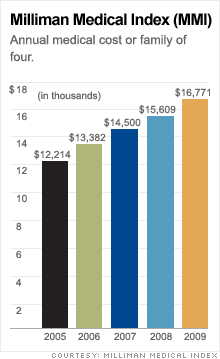Insured workers pay more for health care
Employees' share of medical expenses rises 10.6% from last year, according to industry survey.

NEW YORK (CNNMoney.com) -- More employers are citing the recession for shifting a bigger portion of their health care costs to employees in 2009, an industry report said Monday.
American workers have seen an average increase of 10.6% over the past year in the amount they spend on health care services, according to health care consulting firm Milliman's fifth annual Milliman Medical Index (MMI).
The $650 increase includes $500 for employee contributions to their company's health plan and $150 for employee out-of-pocket expenses
It was the third straight year of double-digit percentage increases in employees' share of health care costs, according to the Millman index.
According to the Census Bureau, 177 million American -- more than half the population -- are covered by employer-provided health insurance.
"There is tremendous pressure to reduce health care costs and also to cover the uninsured," Lorraine Mayne, principal and consulting actuary with Milliman. "Clearly these trends point to the urgency of the health care debate that is going on in Washington."
Employers' subsidies on their workers' coverage increased about $500, or 5.4%, over the past year, the report said.
The rise in employees' costs exceeded employer costs by 30%. "In the history of the MMI, the increase in employee costs has never exceeded the increase in employer costs by more than 10%," the report said.
Total 2009 medical costs for a typical American family of four, including both employer and employee costs, increased 7.4% in the past year to $16,771.
"Employers are struggling in this economic downturn," said Ron Cornwell, principal and consulting actuary with Milliman. "They are trying to manage their [business] expenses. Previously employers were picking up their portion of [health care] cost increases. Now they are implementing further increases in employees' out-of-pocket deductions and co-payments."
In terms of the actual health care cost components, physicians made up the biggest chunk, at 34% of total medical costs, according to the report. But the rate of increase in physican costs actually declined to 6% from 6.2% in 2008.
The fastest growing component of health costs in the report is hospital outpatient care, up 10.2%. Hospital outpatient care makes up 17% of total health care costs.
Pharmacy costs rose 7.9%, as consumers fill more prescriptions -- even though many of them are generics aimed at cutting costs.
Looking at 14 major metropolitan cities, the report cited Miami, New York and Chicago as three cities where health care expenses are 10% more costly than the national average. Miami tops the list, at 21% more costly than the national average.
By contrast, health care costs in Phoenix are 11% lower than the national average.
The Milliman index is based on a national survey of more than 4,000 employers as well as data from the Kaiser Family Foundation. ![]()

